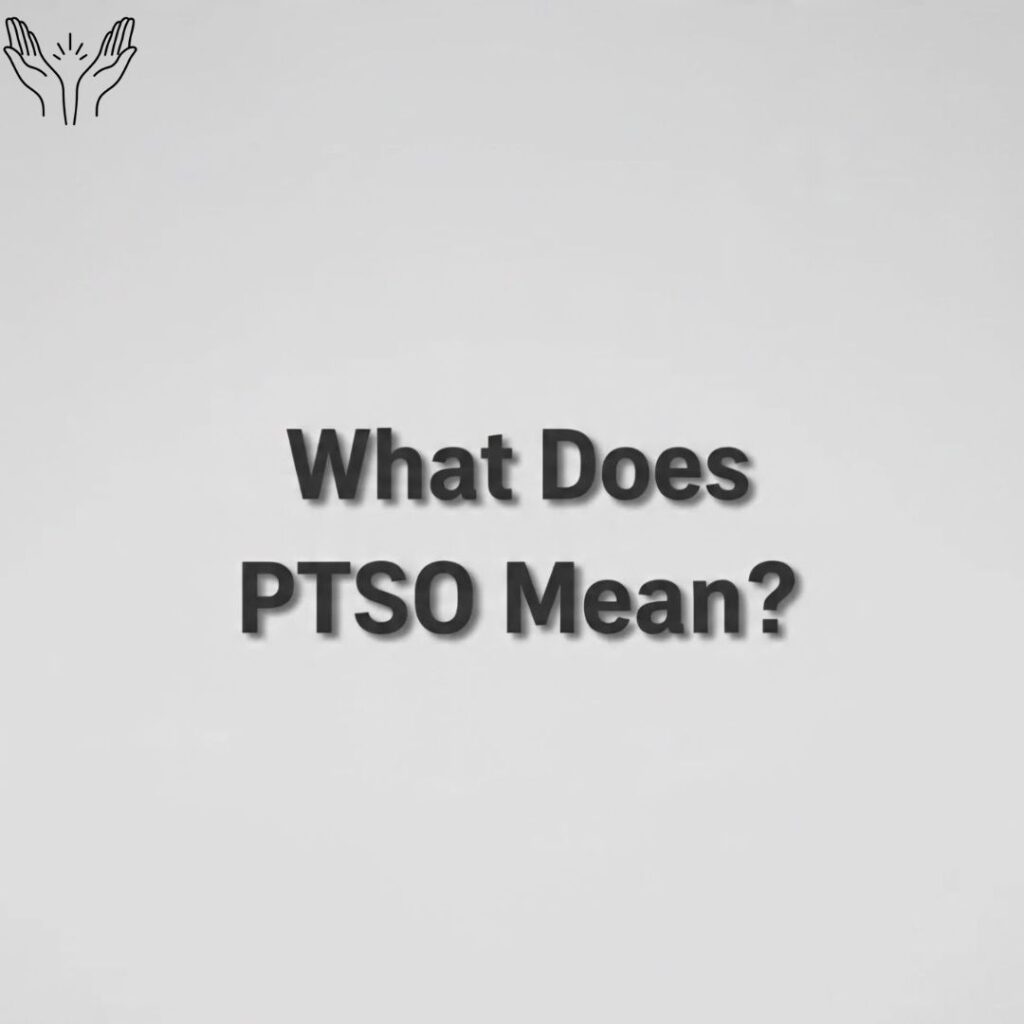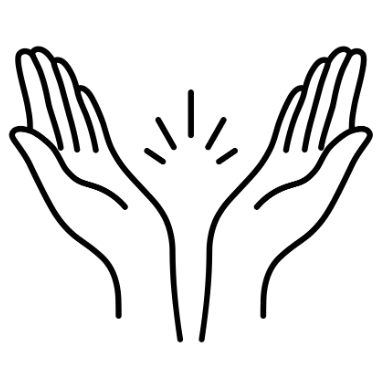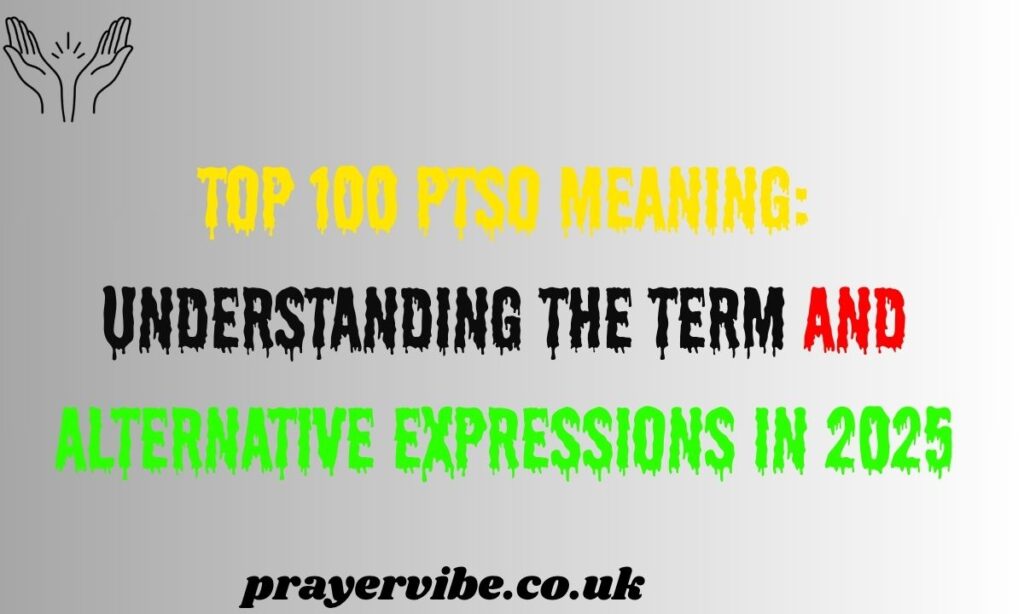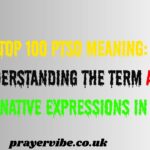In 2025, the term PTSO has gained attention in online chats, social media, and texting. It usually stands for “Post Traumatic Stress Overload,” referring to emotional overwhelm from stress or trauma. People use it casually to describe feeling mentally or emotionally drained.
However, it can also be used more seriously in mental health discussions. It’s important to know when and how to use it based on the situation. This guide will explain the top 100 meanings, alternative ways to say it, and how to use it in the right way.
🙏 Divine Prayer Generator
Select a prayer category to begin
What Does PTSO Mean?

In 2025, the acronym PTSO has emerged as a trending slang and mental health reference in both online and offline spaces. While often confused with PTSD (Post-Traumatic Stress Disorder), PTSO stands for Post-Traumatic Stress Overload.
The key difference lies in intensity and context. PTSO is a non-clinical, slang-based phrase used by many—especially Gen Z and Millennials—to describe a feeling of being emotionally maxed out due to trauma, stress, or burnout.
The Origin and Use in Popular Culture
PTSO likely began gaining popularity through platforms like TikTok, Reddit, and Instagram, where users began saying things like “I’m having full-blown PTSO after that exam” or “Work gave me PTSO today.”
It’s an exaggerated way to express extreme emotional overload without necessarily meaning a diagnosed disorder. However, the phrase walks a thin line between humor and sensitivity, as it references real emotional pain.
Clinical vs. Slang Use
Unlike PTSD, which is a medical diagnosis, PTSO is not recognized by psychologists or therapists. Yet it resonates because people want a way to label overwhelming experiences that don’t quite fit into a clinical box. PTSO may refer to:
- Stress after heartbreak or a breakup
- Trauma after a toxic friendship
- Burnout from school, work, or family issues
- Overwhelm from a traumatic event, but not severe enough to be PTSD
Emotional Relevance in 2025
With rising global anxiety, work pressure, political turmoil, and post-pandemic trauma still fresh, terms like PTSO allow people to self-identify their emotional state more casually. It has become part of mental health advocacy and online humor, often used in memes like:
- “Watching the news gave me PTSO again 💀”
- “I got ghosted. PTSO activated.”
Criticism and Controversy
Mental health professionals caution that using terms like PTSO flippantly can minimize real trauma. While it helps normalize talking about emotions, it can also blur lines between slang and clinical discussion.
It’s essential to distinguish joking use from genuine emotional pain, and users should avoid diminishing others’ experiences.
Polite Alternatives to PTSO-Related Expressions
Polite alternatives help you express emotional stress gently and respectfully. Instead of saying “I have PTSO,” try saying “I’m feeling emotionally drained” or “I’ve been overwhelmed.”
These options are kinder and more thoughtful. They work well in everyday conversations, especially when talking to someone older or not familiar with slang.
Why Use Polite Alternatives?
While PTSO may be common in informal speech, not everyone appreciates it. Using more respectful or empathetic alternatives helps preserve professionalism and emotional awareness, especially in mixed or older audiences.
10 Polite Alternatives and When to Use Them
- “I’ve been feeling emotionally drained.”
- Best for: Conversations with friends, teachers, or parents
- Why: Softens the expression without trivializing emotional struggle
- Best for: Conversations with friends, teachers, or parents
- “That situation left me really overwhelmed.”
- Best for: Work meetings, presentations, or HR discussions
- Why: Keeps tone respectful and safe for professional environments
- Best for: Work meetings, presentations, or HR discussions
- “I’m still processing what happened.”
- Best for: When reflecting on tough or triggering events
- Why: Shows introspection and grace, avoiding slang
- Best for: When reflecting on tough or triggering events
- “That hit me harder than I expected.”
- Best for: Light-hearted chats where you want empathy
- Why: Expresses emotional vulnerability without sounding dramatic
- Best for: Light-hearted chats where you want empathy
- “I’m feeling a little off lately.”
- Best for: Casual one-on-one conversations
- Why: Opens the door to deeper dialogue without pressure
- Best for: Casual one-on-one conversations
- “I’m dealing with a lot emotionally right now.”
- Best for: Support groups, personal development spaces
- Why: Allows others to show empathy
- Best for: Support groups, personal development spaces
- “That left a mark on me emotionally.”
- Best for: After traumatic experiences that aren’t easy to explain
- Why: Poetic yet gentle
- Best for: After traumatic experiences that aren’t easy to explain
- “I’m having a rough time moving past that.”
- Best for: When you want someone to know your struggle is ongoing
- Why: Offers a realistic view without sounding abrupt
- Best for: When you want someone to know your struggle is ongoing
- “I’ve been mentally exhausted.”
- Best for: Family, friends, therapists
- Why: Emotionally accurate and polite
- Best for: Family, friends, therapists
- “I’ve been through a lot lately.”
- Best for: Soft intros to deep conversations
- Why: Widely accepted and free of judgment
Tone and Delivery Tips
- Speak from personal experience, not exaggeration
- Avoid “LOL” or emojis in serious conversation
- Match the tone of the person you’re speaking to
Professional Alternatives to PTSO-Related Expressions
In formal settings like work or school, use professional phrases. Say “I’m experiencing emotional fatigue” or “I’m managing a lot of stress” instead of slang.
These expressions sound mature and respectful. They help you share your feelings without sounding too casual. Use them in emails, meetings, or HR conversations.
Importance of Professional Language
Using PTSO in professional settings can appear immature or dismissive. Instead, opt for measured, emotionally intelligent expressions that show self-awareness and accountability.
Examples by Situation
Workplace Burnout
- “I’m currently navigating some stress-related fatigue.”
- “I’ve reached a point of emotional burnout and need time to reset.”
Post-Conflict or Tension
- “The recent issue was emotionally taxing, and I’m working through it.”
- “That meeting left me feeling drained; I need time to recalibrate.”
Leadership or Team Roles
- “Let’s recognize that some team members might be feeling emotionally overloaded.”
- “We need to address the emotional fatigue affecting performance.”
Career Transitions or HR
- “Due to prolonged emotional strain, I’d like to explore time-off options.”
- “I’m seeking wellness support as I navigate some recent personal stressors.”
Email Templates with Alternatives
Subject: Mental Health & Time Off Request
“I’ve been experiencing emotional overload due to extended stress and would like to request a short break to restore balance. I’ll ensure my responsibilities are transitioned smoothly.”
Subject: Wellness Update
“Following recent challenges, I’ve noticed increased emotional exhaustion. I’m implementing wellness strategies to regain focus.”
Key Principles for Professional Tone
- Use clinical but empathetic language
- Avoid slang and exaggeration
- Maintain clarity and responsibility
Casual Alternatives to PTSO-Related Expressions
For friendly chats, casual phrases work better. Instead of saying “I have PTSO,” try “I’m mentally fried” or “That really shook me.” These expressions are fun, simple, and easy to understand. They fit well in texts, group chats, or social media. They help you express stress without sounding too serious.
Why Use Casual Alternatives?
In daily conversations with friends, partners, or peers, slang like PTSO may be funny or expressive, but it can become repetitive or misunderstood. Here are creative, casual, yet emotionally authentic alternatives.
Fun & Friendly Phrases to Use Instead of PTSO
- “My brain is fried from that.”
- Common and funny, especially after school/work
- Common and funny, especially after school/work
- “That totally wrecked my mood.”
- Emotionally honest without sounding clinical
- Emotionally honest without sounding clinical
- “I’m still mentally unpacking that.”
- Reflective and relatable
- Reflective and relatable
- “I’m emotionally wiped.”
- Simple and clear
- Simple and clear
- “I need a full system reboot after that.”
- Tech humor meets emotion
- Tech humor meets emotion
- “I’ve hit max capacity emotionally.”
- Evokes visual overload
- Evokes visual overload
- “That memory still haunts me.”
- Dramatic but fun in the right context
- Dramatic but fun in the right context
- “I felt that in my soul.”
- Perfect for TikTok or reels
- Perfect for TikTok or reels
- “That threw me for a loop emotionally.”
- Conversational and expressive
- Conversational and expressive
- “That gave me flashbacks I didn’t want.”
- Popular meme-based phrase
When to Use Casual Expressions
- In text convos with close friends
- On social media captions/stories
- In venting sessions or light-hearted rants
Keep It Real
Even casual phrases should respect serious emotional experiences. Use them to connect, not invalidate.
How to Choose the Best Alternative?

To pick the best phrase, think about who you’re talking to and where. Use polite or professional phrases for formal talks. Go with casual ones for friends or online. Match the tone to the situation. If it’s serious, be honest and soft. If it’s light, use humor or emojis carefully.
Factors to Consider
- Audience
- Are you speaking to a friend, coworker, therapist, or audience online?
- Choose based on formality, age, and relationship.
- Are you speaking to a friend, coworker, therapist, or audience online?
- Setting
- Public, private, digital, or professional setting?
- Context changes everything.
- Public, private, digital, or professional setting?
- Emotion Type & Intensity
- Is the experience mildly stressful, deeply traumatic, or ongoing?
- Match your phrase to the emotional weight.
- Is the experience mildly stressful, deeply traumatic, or ongoing?
- Intent
- Are you venting, asking for help, sharing a story, or just joking?
- Are you venting, asking for help, sharing a story, or just joking?
- Cultural Sensitivity
- Avoid using “PTSO” to describe trivial things (like “that TikTok gave me ptsd 😭”)
- Be mindful of trauma survivors in your circle.
- Avoid using “PTSO” to describe trivial things (like “that TikTok gave me ptsd 😭”)
Recommended Combinations
| Situation | Best Phrase Example |
| With Boss | “I’m dealing with emotional overload.” |
| With Friends | “I’m fried from everything.” |
| Social Media | “Brain = overloaded. Send snacks. 🧠💥” |
| With Therapist | “I feel like I’m on the edge emotionally.” |
| Job Interview | “I’m learning to manage emotional stress.” |
Decision-Making Flow
- Formal? → Use respectful language
- Informal? → Use humor or slang
- Serious topic? → Be honest and grounded
- Online joke? → Use memes and emojis wisely
Optimized Texting Examples
When texting, keep it simple and real. Instead of “I’ve got PTSO,” try “That drained me” or “I’m feeling off.” Emojis help show your tone like 😵💫 or 😩. Use friendly words that feel true to you. Short, honest texts are better than slang when sharing real emotions with others.
Common Texting Situations and Suggested Alternatives
1. After a stressful day at work
Text: “That shift gave me full-on emotional burnout 😩”
Alternative: “I’m wiped after today. I need a recharge.”
2. When venting to a friend
Text: “Bro, I swear that gave me PTSO 😭”
Alternative: “That was a lot. I’m mentally shook.”
3. Chatting with a crush
Text: “Your last message left me in emotional crisis 😅”
Alternative: “Lowkey still thinking about what you said lol.”
4. Comforting someone
Text: “Sounds like you’re dealing with PTSO too 😕”
Alternative: “I can tell that really hit you hard. Want to talk about it?”
5. Posting on social media
Caption: “After that interview… full-blown ptsO 😭👀”
Alternative: “Nervous system: Not Found. #OverloadMode 🧠⚡️”
Emojis and Tone
Use emojis to keep tone casual:
- 😩, 😭, 🧠, ⚡️ for stress
- 🌪️, 💀, 💔 for emotional impact
- 🫠, 😵💫, 😮💨 for burnout or overload
Text Templates
- To friend:
“Hey, just wanted to say today kinda hit me hard. I’m feeling super overloaded. Let’s catch up soon?” - To boss/HR:
“I’ve been dealing with a lot emotionally and may need a day to reset. Hope that’s okay.” - To partner:
“I’m not in the best headspace today. Just wanted to be honest in case I seem off.” - Group chat:
“Anyone else feel like this week was emotionally illegal? 🫠”
Frequently Asked Questions
What does PTSO stand for?
PTSO means “Post-Traumatic Stress Overload,” a slang term for emotional burnout or overload.
Is PTSO a real medical condition?
No, PTSO is not an official medical diagnosis like PTSD; it’s a casual, non-clinical expression.
When should I avoid using the term PTSO?
Avoid using it in professional or sensitive mental health settings where clarity and respect are important.
What’s a respectful alternative to saying PTSO?
Try saying “I’m emotionally drained” or “I’m dealing with a lot” as gentler alternatives.
Can I use PTSO in texting with friends?
Yes, but make sure your tone is clear and the context is appropriate so it’s not misunderstood.
Conclusion
PTSO has become a popular way to express emotional overwhelm in 2025, especially online and in casual conversations. While it’s not a clinical term, it reflects how people are finding new ways to talk about mental and emotional strain in everyday life.
Still, it’s important to be mindful of your audience and the setting. Choosing the right alternative—whether polite, professional, or casual—can help you express your feelings honestly without causing confusion or offense.

Daniel Miller is a passionate writer, SEO expert, and blogger, specializing in Bible verses, prayers, and faith-based content at PrayerVibe.







